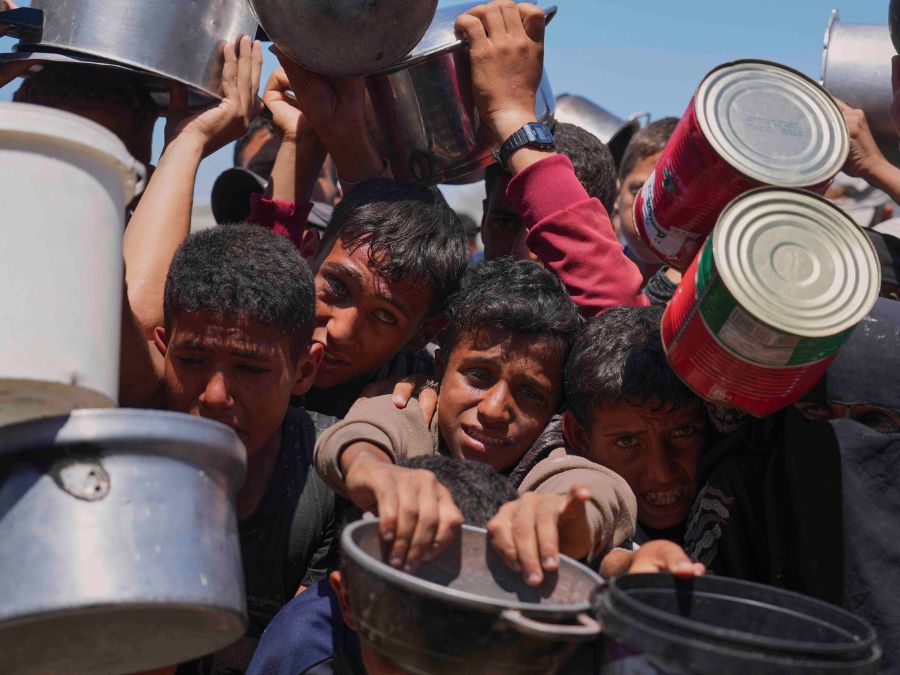Nearly 300 million people from 53 countries around the world are at risk of starvation as global hunger reaches new heights, according to a new report from Global Network against Food Crises and Food Security Information Network. Canadian Foodgrains Bank, an organization partnering with 15 churches and faith-based agencies working to end global hunger, says that international aid cuts and blockades are worsening the issue.
The report categorizes acute food insecurity into five phases: stressed, crisis, emergency, catastrophe and famine. For the first time globally since 2020, it confirms famine status in Sudan, with the same projected for the Gaza Strip by September, if Israel’s large-scale military operations and blockade on humanitarian aid continue.
You may unsubscribe from any of our newsletters at any time.
Canadian Foodgrains Bank has been involved in emergency food assistance and long-term food security since 1983. Executive director Andy Harrington and senior humanitarian manager Stefan Epp-Koop visited South Sudan in March. Harrington told Broadview that the trip was “one of the most harrowing” of his 35-year career in the international development field.
South Sudan, which gained independence from Sudan in 2011, has faced conflict since its birth. As people who had previously fled to Sudan return and those displaced by the war in Sudan seek refuge in their southern neighbour, scarcity runs rampant. The same report projects South Sudan to reach phase 5 or catastrophe-level food security in the next five years.
“Over a million people have been displaced out of Sudan into South Sudan, and this is in a country of about 12 million people,” Epp-Koop said in an interview with Broadview. “South Sudan used to be the breadbasket for that part of the continent and there is lots of agriculture potential if there’s peace, if people are secure, if there is support to help people re-establish livelihoods.”
In addition to violence, Harrington added that U.S. President Donald Trump’s cuts to the United States Agency for International Development (USAID) have exacerbated the hunger crisis.
“We’re seeing pieces of the puzzle fall around us,” Harrington told Broadview. “At one point, I stood outside a childhood malnutrition centre that was going to be closed the next day and was surrounded by parents begging for help for their children. I found out that that was just one of 1,100 childhood malnutrition centres that were going to be closed in South Sudan alone.”
More on Broadview:
-
‘This is where I need to be’: A Canadian doctor reports from a Gaza hospital
- United Church urges Canada to stop arming Israel and support South Africa’s case at the International Court of Justice
Although USAID’s suspension has no direct effects on Foodgrains Bank, which receives the majority of its funding from donations and Global Affairs Canada, Harrington says the loss of 30-40 percent of global aid funding has devastated the international network of humanitarian organizations, who rely on one another’s work to coordinate logistics and address intersecting emergencies like healthcare, water and sanitation.
Dwindling funding isn’t the only obstacle Foodgrains Bank has been grappling with. Delivering food to the Gaza Strip, which is at risk of famine, has been “the most complicated and difficult environment” the organization has worked in.
“When the ceasefire was in place, there was some ability to move food through [….] We have not been able to provide assistance since the beginning of March,” Epp-Koop told Broadview. “We have food that has been purchased. It’s sitting in a warehouse right now. We want to be able to distribute it and do that as soon as possible.”
Harrington is further concerned about disinformation circulating social media, which he says has caused unnecessary mistrust in humanitarian work. In a May 21 statement, U.S. Secretary of State Marco Rubio claimed that “no one has died because of USAID [cuts].” Harrington expressed anger with such characterizations that undermine the urgency of international aid.
“When you hear someone with a suspiciously large social media following saying that no one’s going to die as a result of all these cuts, it’s rubbish,” Harrington said. “Two kids died while I was in the village in South Sudan […] from malnutrition through the cuts. Aid works. It makes the world a better place.”
With conflict dominating as the main driver pushing 20 nations into hunger, according to the report, starvation remains a human-made crisis. Although Foodgrains Bank is involved with longer-term programming, Harrington and Epp-Koop say many of their projects are continually interrupted due to ongoing insecurity, from bombings of their partner agencies’ offices in South Sudan to the Israeli blockades on aid in Gaza.
“Especially as a new government gets settled in, [we must] encourage Canadians to advocate that Canada play a role in the world as a compassionate country that cares for people experiencing need,” said Epp-Koop.
***
Ghazal Azizi is an intern at Broadview.














Just an observation. The folks in the photo do not look like they’re starving. They’re smiling and by the look of the physiques of the ladies in the centre, they certainly seem to have enough fat on them. Perhaps a more authentic photo would get the point across.